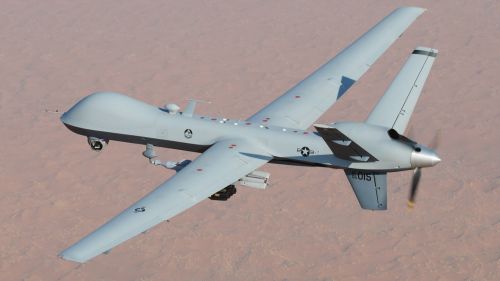Millennials Not That into Drones

More Americans felt drone strikes against suspected terrorists makes the US safer. However, Millennials were more skeptical, with nearly half saying they make the US less safe.
The assassination of Iranian General Qasem Soleimani
Last month’s assassination of Iranian General Qasem Soleimani, and recent news of the US killing an al-Qaeda leader in Yemen, focused Americans’ attention on the Middle East and shed light on the extent to which the United States relies on drone strikes in its foreign policy. As the Council’s January survey showed, more Americans say Soleimani’s killing makes the United States less safe (47%) than more safe (28%), with 22 percent saying it makes no difference. That point of view is particularly strong among Millennials: six in ten (59%) say the strike will make the US less safe, compared to two in ten (22%) who think it will make no difference, and sixteen percent who say it will make the country safer.
Millennials Say Soleimani Strike Will Make US Less Safe
As you may know, the United States conducted an airstrike last week that targeted and killed a top Iranian military commander. Do you think that this action will make the United States more safe, less safe, or make no difference?
Source:
January 10-12, 2020 | n = 876
Chicago Council Surveys
This fits with a broader pattern among Millennials. In the 2019 Chicago Council Survey, roughly half of Americans overall (48%) said that conducting drone strikes against suspected terrorists in other countries makes the US safer, while three in ten (31%) said it makes the US less safe; 19 percent saw no difference. Millennials were more even skeptical of the benefits of drone strikes, with four in ten (42%) saying they make the United States less safe.
Generational Divides on Drone Strikes
In your opinion, does conducting drone strikes against suspected terrorists in other countries make the U.S. more safe, less safe, or do they not make a difference?
Source:
June 7-20, 2019 | n = 1,761
Chicago Council Surveys
Still, Millennials haven’t rejected the US drone program entirely. Two-thirds (67%) still see drone strikes against suspected terrorists in other countries as an effective approach to achieving US foreign policy goals, though this is lower than for older generations. But Millennials are notably less likely to see drone strikes as a very effective approach (26%, vs. 33% of Gen X and 44% of Boomers).
Millennials and Drone
How effective do you think drone strikes against suspected terrorists in other countries are to achieving the foreign policy goals of the United States—very effective, somewhat effective, not very effective, or not effective at all?
Source:
January 10-12, 2020 | n = 876
Chicago Council Surveys
So what kinds of policies do Millennials favor? Alliances come out on top. Seven in ten Millennials say that US alliances with other countries make the US safer (72%), and a majority of Millennials (53%) say that maintaining existing alliances is a very effective means of achieving US foreign policy goals. Millennials also see maintaining US military superiority (56%), promoting democracy and human rights (54%), and participating in international organizations (54%) as making the US safer.

